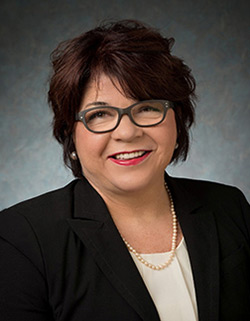Breast Cancer Survivor
Be Strong for Yourself and Your Family
By Gayla Tocco
Stage I breast cancer
 I was always an advocate of getting a yearly exam, and in June 2009 at age 58, my annual mammogram came up positive for ductal carcinoma in situ (DCIS). I felt like I was pretty well-educated before I was diagnosed, but nothing prepares you for hearing that kind of news. I was sad—but mostly afraid. I have a strong faith, though, and knew that He would see me through it all.
I was always an advocate of getting a yearly exam, and in June 2009 at age 58, my annual mammogram came up positive for ductal carcinoma in situ (DCIS). I felt like I was pretty well-educated before I was diagnosed, but nothing prepares you for hearing that kind of news. I was sad—but mostly afraid. I have a strong faith, though, and knew that He would see me through it all.
Telling my kids was truly the hardest part of facing a cancer diagnosis. I wanted to tell them in person, but with both of them living away at the time, I had to deliver the news over the phone, which was a very difficult thing for me to do. They came home, and we spent the weekend going over the excellent prognosis and celebrating life.
I trusted completely in my medical staff, which consisted of an oncology team, breast surgery team and plastic surgeon. I also did a lot of Internet research because I wanted to contribute to my treatment plan. Together, my team and I decided that my treatment would consist of a double mastectomy and breast reconstructive surgery, followed by a maintenance drug for seven years. The first steps and the first year were very hard, but by being an active participant on my medical team, I went into treatment feeling confident and strong.
My body responded well to the surgeries; however, at times I feel like I have on a life jacket and wish I could get rid of the reconstruction. On occasion, nerve endings show up unexpectedly and create some pain, and there are times I need to conscientiously stop looking at myself and thinking about how the cancer changed my body. It’s at these times though, that I’m most thankful to be alive. As my older brother told me after my surgery, “Who cares if you don’t have boobs, you’re alive!”
My circle of support was amazing. Friends brought food, cleaned my house, showed support, yet still respected my privacy. I had a dear friend who would leave Starbucks on the porch and text me to let me know it was out there if she knew I wasn’t feeling well. My husband, kids and brother were always there for me, and my mother visited me after my last surgery. Although he kept it to himself, I could tell my husband struggled, but I just remained positive and now we talk openly about it.
Following my surgeries, I made it my goal to inform and educate other women on the importance of mammograms and sonograms. I attended speaking engagements about cancer awareness and shared my story with friends and strangers alike. If I could save one woman’s life by advocating early detection, I was going to do it!
Through my journey, I came to realize I’m a strong and confident person and God never gives you more than you can handle. I also learned that regardless of the support you have, cancer is a very private journey and many times you can feel alone, even in a room full of family and friends. But you will make it. Be strong for yourself and your family. For me, it helped that I cried only at a certain time of day and then returned to as much normalcy as possible—working, cooking, entertaining and living my life. For me, strength isn’t about how much you smile and respond with an “I’ll be fine,” it’s about taking the time to understand your emotional needs, depend on your faith, and think of others and how you make a difference in their lives.


